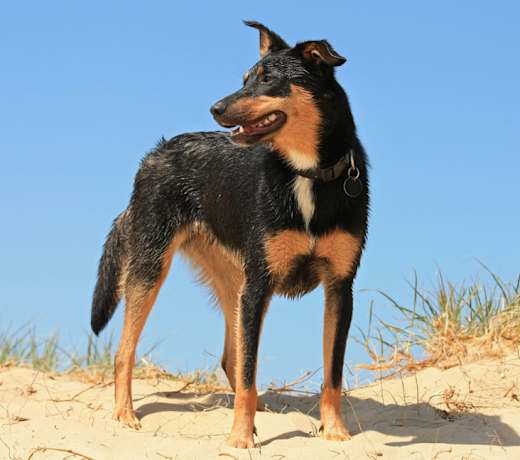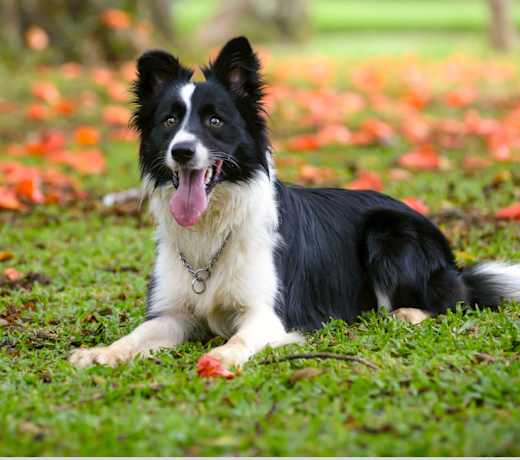Australian Shepherds are medium-sized dogs who weigh between 38 to 66 pounds and stand around 18 to 23 inches tall on average. Factors such as genetics, diet, and exercise can influence an Australian Shepherd's size, but these general height and weight ranges provide a good guideline for the breed.
Australian Shepherd
Breed Type: Herding
Common nicknames: Aussie
Coat: Double
Hypoallergenic: No, they will likely trigger allergies.
Temperament: Vocal, playful, affectionate, devoted
Life expectancy: 12-15 years
Color & patterns:
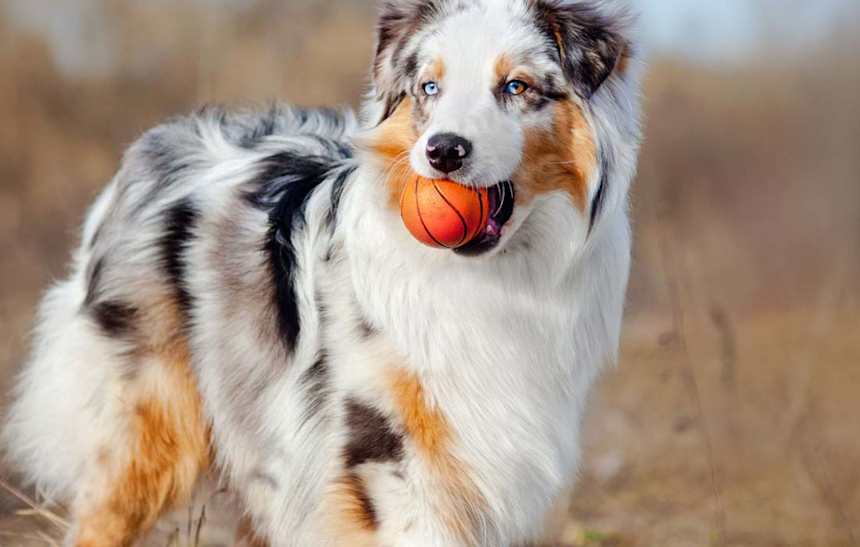
Looking for a pup who has brains, brawn, and a whole lot of personality? Meet the Australian Shepherd, or “Aussie” for short. These medium-sized dogs typically weigh between 35 and 70 pounds and are chock-full of spunk and intelligence, making them the perfect addition to any active household. With their striking coat colors and piercing eyes, Aussies turn heads wherever they go. But these dogs are much more than their good looks: They’re also known for their herding skills and make excellent farm dogs. Whether you’re looking for a jogging buddy or a hiking companion, an Aussie is always up for an adventure. While they may require some extra mental and physical stimulation, their unwavering loyalty and affection are worth every bit of effort. If you’re looking for a glow-up in your life, the stunning Aussie might just be the solution.
Australian Shepherd characteristics
Learn about about Australian Shepherd basics like their fur colors, shedding levels, how much grooming they need, and other Australian Shepherd facts.
Average height
18-23 inches (45.7-58.4cm)
Average weight
38-66 pounds (17.2-29.9 kg)
Average lifespan
12-15 years
Exercise needs
Grooming needs
Full-grown size
Good with cats
Good with kids
Training aptitude
How big do Mini Australian Shepherds get?
Miniature Australian Shepherds stand between 13 to 18 inches tall at the shoulder and weigh between 20 to 40 pounds on average. Also known as Mini Aussies, Miniature Australian Shepherds are a smaller version of the standard Australian Shepherd breed and are now considered their own breed.
Do Australian Shepherds shed?
Yes, Australian Shepherds are moderate to heavy shedders. They shed most in the spring when they lose their thick winter coat, but they also shed year-round. Their coat consists of a dense, weather-resistant outer coat and a softer undercoat.
The thickness of their undercoat will depend on the time of year. It gets thicker in the winter to keep them warm and protect against the elements. They start to shed their coat in the Spring so they can stay cool in the Summer. During their heavy shedding periods, it’ll help to invest in a quality de-shedding tool as this will help keep dead and loose fur off your floor when they are shedding more.
What colors do Australian Shepherds come in?
Australian Shepherds come in four main coat colors black, blue merle, red, and red merle. In addition, there are four different types of markings and variations for black-colored Aussies (black tri-colored, black and white bi-colored, full black, and black-and-tan. Red Aussies can be tri-colored, red and white, or solid red. There are four types of blue merle Aussies, blue merle tri-color, blue merle and white, blue merle and tan, and solid blue merle.
Do Australian Shepherds have tails?
Yes, Australian Shepherds have tails, but their tails vary in length. Some Australian Shepherds are born with naturally bobbed tails, meaning their tails are very short. Research shows that roughly one in every five Aussies is born with a naturally bobbed tail.
While some dog breeds have specific tail traits that are essential for their work (e.g., pointing in hunting dogs), Australian Shepherds are herding dogs and the absence of a full-length tail actually makes it safer to perform herding tasks.
Can you shave Australian Shepherds?
No, you shouldn’t shave Australian Shepherds. Their double coat serves as insulation, protecting them from both heat and cold. Shaving can disrupt this natural insulation and potentially lead to temperature-related issues.
What does an Australian Shepherd look like?
Australian Shepherds are medium-sized dogs with a strong and agile build, well-suited for their herding background. They have a medium-length double coat with white markings and copper points on their face, legs, and chest. Aussies come in a variety of coat colors, but the primary colors recognized in the breed standard are Black, Blue Merle, Red, and Red Merle.
Their most distinctive feature is their almond-shaped eyes, which can be various colors and are sometimes even marbled or split. Their ears are triangular and set high on their head, giving them an alert and attentive expression. Many Australian Shepherds have bobbed tails, though some may have full-length tails depending on their genetics.
What is the rarest Australian Shepherd color?
A solid red coat is the rarest color for an Australian Shepherd. This color isn’t as popular as the “blue merle” and “red merle” coat colors which are more common and well-recognized.
It’s important to note that the rarity of a coat color should not be the primary consideration when choosing an Australian Shepherd. Instead, focus on finding a healthy dog with a temperament and characteristics that align with your lifestyle and preferences.
How long do Australian Shepherds live?
Australian Shepherds live between 12 and 15 years. Of course, individual lifespans can vary depending on factors such as genetics, diet, exercise, and overall care. Good genes and a healthy lifestyle can help these dogs reach their senior years, so it’s essential to provide them with proper nutrition, regular exercise, and routine veterinary care to give them the best shot at a long and healthy life.
When do Australian Shepherds stop growing?
Australian Shepherds stop growing by 12 to 16 months of age. However, their bodies may continue to fill out and develop muscle tone until they’re about two to three years old. Keep in mind that individual dogs may have slight variations in their growth rates, so it’s essential to monitor their nutrition and exercise to ensure they develop at a healthy pace.
Are Australian Shepherds hypoallergenic?
No, Australian Shepherds are not hypoallergenic. These pups release allergenic proteins found in their dander, saliva, and urine, which can trigger allergies in people who are sensitive to them.
How many types of Australian Shepherds are there?
There are two types of Australian Shepherds that come in four coat colors and three patterns. In 2015, the Miniature Australian Shepherd was recognized as their own breed, separate from Australian Shepherds.
Australian Shepherd temperament
Learn about about the Australian Shepherd temperament and how well they fit into your lifestyle, home environment, and family.
Do Australian Shepherds bark a lot?
Yes, Australian Shepherds bark a lot. They are vocal dogs, and, like most dogs, they tend to bark when playing, at loud noises and intruders. However, they can be discouraged from excessive barking with proper training and exercise.
One way to curb excessive barking is by teaching your Aussie the “speak” and “quiet” cues to let them know when it’s appropriate to bark. Keeping their bodies active and minds stimulated with plenty of exercise can also reduce their tendency to bark.
Are Australian Shepherds good with kids?
Yes, Australian Shepherds are good with kids. The Australian Shepherd’s high energy and playful nature make them great playmates for older children.
Because they are herding dogs, however, Australian Shepherds may try to herd small children when playing. The instinct to nip at the heels of people to corral them can be halted with bite-inhibition training and by redirecting their instincts towards games or toys. The best thing you can do is to provide them with plenty of socialization, as the more they are exposed to children, the less likely they are to herd or nip.
As with any breed, it is recommended that your child is always supervised when interacting with your Australian Shepherd to keep both the child and dog safe. Teaching children how to properly approach and handle dogs is also crucial to ensure positive experiences for both the dog and the child.
Are Australian Shepherds easy to train?
Yes, Australian Shepherds are easy to train due to their intelligence and willingness to please. They respond to consistent, positive reinforcement and excel in various canine activities such as obedience, agility, and herding trials.
Their high energy and high intelligence means they need to feel like they are working. It’s not enough to teach your Aussie basic commands and let them be, they’ll want to practice what they’ve learned. Agility training is often great for Aussies because it allows them to use their intelligence to figure out obstacle courses while also getting a good amount of exercise in.
When it comes to training your Aussie, the most important thing will be sticking to a schedule and really helping them expend their energy. Keep in mind that training dogs takes time (think months and years, not days) — it isn’t instant, regardless of breed.
Are Australian Shepherds good with other dogs?
Yes, Australian Shepherds can be good with other dogs. Their compatibility often depends on each dog’s personality, temperament, and previous socialization. Proper introductions and supervision allow many Aussies to coexist happily with other dogs.
Are Australian Shepherds good dogs?
Yes, Australian Shepherds are good dogs for individuals or families willing to invest time in their care, training, and exercise needs. These are good pups for those who can provide them with all the mental and physical challenges they crave.
Are Australian Shepherds good guard dogs?
Yes, Australian Shepherds are good guard dogs. They’re incredibly loyal and often only accept strangers once they’ve been proven acceptable by their family.
Do Australian Shepherds like water?
Yes, Australian Shepherds like water. Like any breed, however, individual preferences can vary. Some Aussies take to water easily, whereas others may be more cautious or reserved around water, especially if they haven’t been exposed to it from a young age.
Are Australian Shepherds smart?
Yes, Australian Shepherds are smart. They are often regarded as one of the smartest dog breeds due to their sharp minds and problem-solving abilities. But being super smart also means they need a lot of mental stimulation and challenges to stay engaged and happy; without mental exercise, they can become bored and potentially exhibit undesirable behaviors.
Are Australian Shepherds good family dogs?
Yes, Australian Shepherds are great family dogs. These pups are incredibly affectionate, adaptable, intelligent, and devoted. Australian Shepherds’ loyalty makes them excellent watchdogs, and their sense of humor and eager desire to please make them well-suited to families, especially those who understand their dog’s need to direct their energy toward exercise and useful pursuits. If you have an active family that likes to go on hikes and explore, an Australian Shepherd could be perfect for you.
Do Australian Shepherds like the cold?
Australian Shepherds can tolerate the cold weather better than other breeds because their double coat provides good insulation. Whether they “like” the cold, however, varies from dog to dog. Some Australian Shepherds may enjoy the cooler temperatures and even frolic in the snow, while others may prefer to stay cozy indoors when it’s cold outside.
Are Australian Shepherds good with cats?
Yes, Australian Shepherds can get along with cats. Creating a positive relationship, however, requires careful introduction, ongoing supervision, and training to manage any potential conflicts between the two. Australian Shepherds are herders, so you may find them trying to herd your cat if they are bored and restless, so make sure they get plenty of exercise and work motivation elsewhere. Giving your cat a place where they can retreat will help them not feel smothered or trapped.
Of course, each dog has their own preferences and temperament, but if properly socialized to your cat and/or introduced at a young age, your Australian Shepherd and cat should get along well.
Australian Shepherd history
Learn about where the Australian Shepherd came from.
What were Australian Shepherds bred for?
Australian Shepherds were bred for herding livestock, primarily cattle and sheep. These dogs are known for their incredible intelligence, agility, and herding instincts. They were invaluable working companions for American shepherds and ranchers, particularly in the western United States, where they helped manage and move livestock across vast expanses of land.
Are Australian Shepherds from Australia?
No, Australian Shepherds aren’t from Australia but from the American West. The breed became associated with Basque sheepherders who came to the United States from Australia in the 1800s, and the name “Australian Shepherd” stuck. So, don’t be fooled by the name; they’re as American as apple pie and rodeos.
Where are Australian Shepherds from?
Australian Shepherds come from the United States, despite their name. The Australian Shepherd was created from a combination of herding breeds in California in the mid-19th century. Their roots are thought to be from herding dogs from the Basque region.
Australian Shepherd health
Learn about about the Australian Shepherd health outlook and what diseases they may be prone to at various stages of their life.
Do Australian Shepherds need to be groomed?
Yes, Australian Shepherds need to be regularly groomed to keep their double coat healthy. These pups require weekly brushings to help prevent the coat from becoming matted.
Their coat is not difficult to groom, and baths are needed only when they get dirty. Trim their nails as needed, check and clean their ears, and maintain good dental hygiene. Keep an eye on their unique eyes for any issues.
What diseases are Australian Shepherds prone to?
Australian Shepherds are prone to a few diseases, including:
Hip Dysplasia: Hip dysplasia is one of the most common skeletal diseases seen in dogs. Hip dysplasia is caused by a joint that has grown abnormally or is misshapen. The abnormal shape prevents the joints and sockets from properly meeting one another, resulting in rubbing and grinding instead of sliding smoothly.
Elbow Dysplasia: Unlike hip dysplasia, where the main problem is joint instability, the abnormalities seen in elbow dysplasia often result in pieces of bone and/or cartilage breaking loose and irritating the joint tissues. Over time, the rubbing from dysplasia can cause a variety of issues, such as pain, lameness and secondary osteoarthritis. Surgery can be done to fix the joint if diagnosed before the onset of arthritis.
Eye problems: These include a detached retina; cataracts, a common eye condition that causes cloudiness in the eye and obstructs vision; distichiasis, abnormal growth of eyelashes on the margin of the eye, resulting in irritation to the eye; collie eye anomaly, a congenital defect that causes abnormalities or unusual changes in the eye and may lead to blindness; progressive retinal atrophy, a progressive degenerative disease affecting the retina that eventually leads to blindness; epiphora, an issue that causes excessive eye watering; and persistent pupillary membranes, a condition in which remnant strands of fetal tissue cross over the iris.
Hypothyroidism: Australian Shepherds may also experience hypothyroidism, a condition where the thyroid becomes underactive and does not produce enough body-regulating hormones.
Other health issues: Allergies; drug sensitivity; and cancer. Australian Shepherds are also the most common breed to be affected by epilepsy.
If you are rescuing an Australian Shepherd, have them checked out by a vet to see if they have or are prone to getting these diseases so you know what they will be able to handle in terms of activities and exercise.
What do Australian Shepherds usually die from?
According to one study, over 31 percent of Australian Shepherds die from cancer. Other causes of death for Aussies include old age, diseases, and epilepsy.
It’s important to note that not all Australian Shepherds will experience these health concerns, and responsible breeding practices can help reduce the risk of hereditary diseases. Regular veterinary care, a healthy diet, exercise, and preventive measures can also contribute to a longer and healthier life for Australian Shepherds.
Do Australian Shepherds have health issues?
Australian Shepherds are healthy on the whole, though they do suffer from some genetic health issues such as epilepsy, hip dysplasia, eye disorders, autoimmune diseases, heart disease, and various forms of cancer, including lymphoma, and osteosarcoma.
Regular veterinary check-ups, a nutritious diet, exercise, and preventative measures are essential for Australian Shepherds to live a long and healthy life.
Popular Australian Shepherd mixes
A few common Australian Shepherd mixes include:
Aussie Doodle (Australian Shepherd + Poodle)
Aussiedor (Australian Shepherd + Labrador)
Australian Retriever (Australian Shepherd + Golden Retriever)
Aussalier (Australian Shepherd + Cavalier King Charles Spaniel
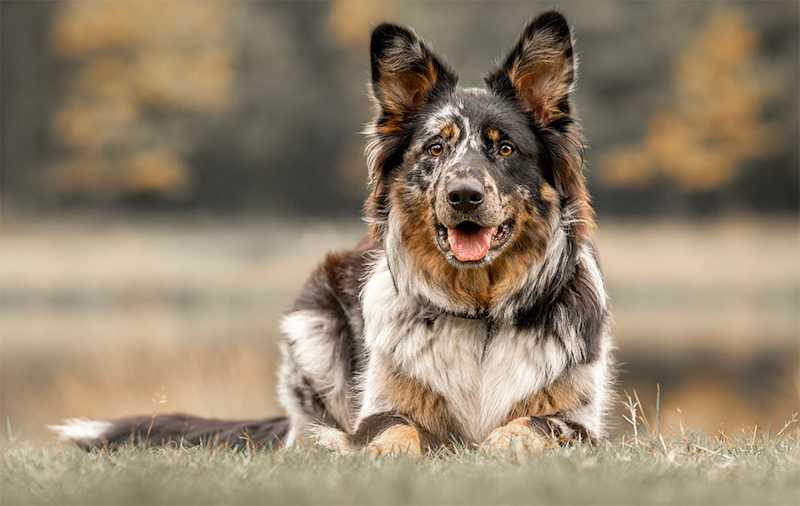
Find Australian Shepherd puppies near you
Adopting an Australian Shepherd
Learn about acquiring an Australian Shepherd - the pros and cons of adopting versus going through a breeder, and associated costs.
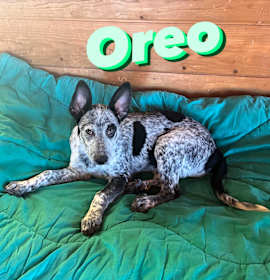
Oreo
Australian Shepherd
Male, puppy
Los Angeles, CA

SUGAR
Australian Shepherd
Female, adult
Los Angeles, CA

Drywall
Australian Shepherd American Staffordshire Terrier
Male, 2 mos
Los Angeles, CA

Monkey Wrench
Australian Shepherd American Staffordshire Terrier
Male, 2 mos
Los Angeles, CA

Leatherman
Australian Shepherd American Staffordshire Terrier
Male, 2 mos
Los Angeles, CA

Plywood
Australian Shepherd American Staffordshire Terrier
Male, 2 mos
Los Angeles, CA

Carhartt
Australian Shepherd Mixed Breed (Medium)
Female, 7 mos
Los Angeles, CA
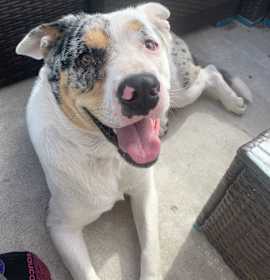
Queen
Australian Shepherd American Staffordshire Terrier
Female, 5 yrs
Studio City, CA
Needs experienced adopter
House-trained
Shots are up-to-date

Oreo
Australian Shepherd
Male, puppy
Los Angeles, CA

SUGAR
Australian Shepherd
Female, adult
Los Angeles, CA

Drywall
Australian Shepherd American Staffordshire Terrier
Male, 2 mos
Los Angeles, CA

Monkey Wrench
Australian Shepherd American Staffordshire Terrier
Male, 2 mos
Los Angeles, CA

Leatherman
Australian Shepherd American Staffordshire Terrier
Male, 2 mos
Los Angeles, CA

Plywood
Australian Shepherd American Staffordshire Terrier
Male, 2 mos
Los Angeles, CA

